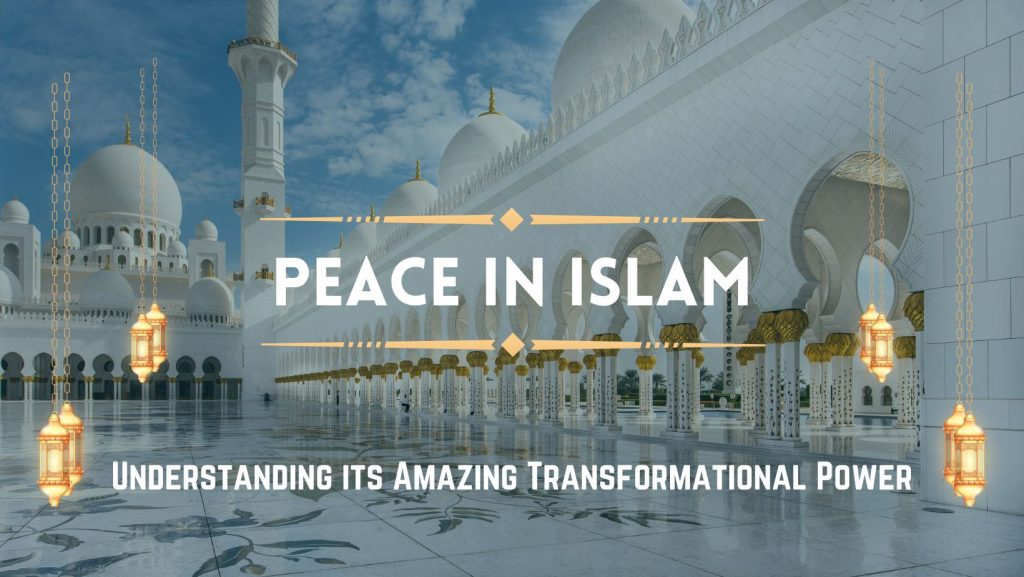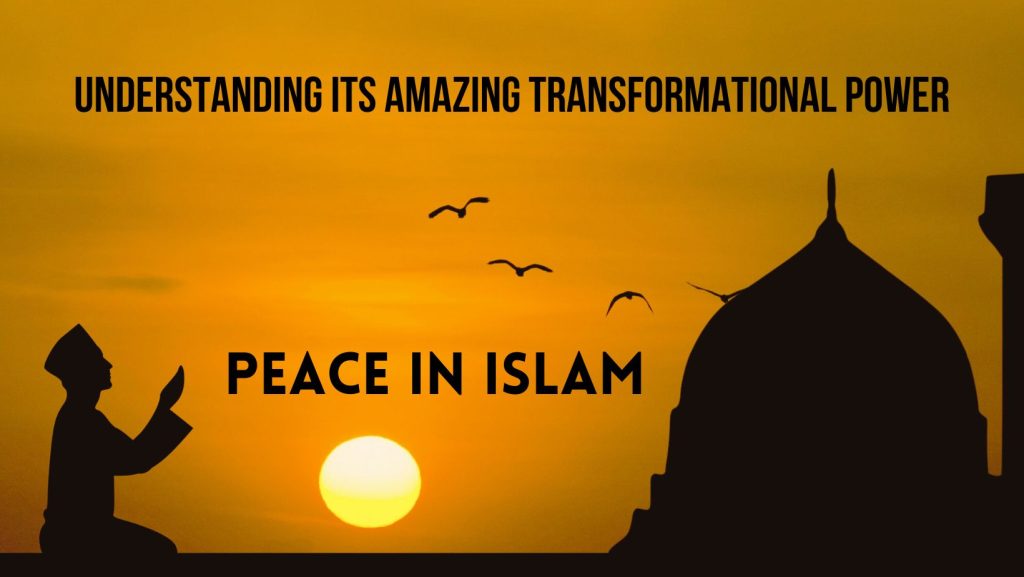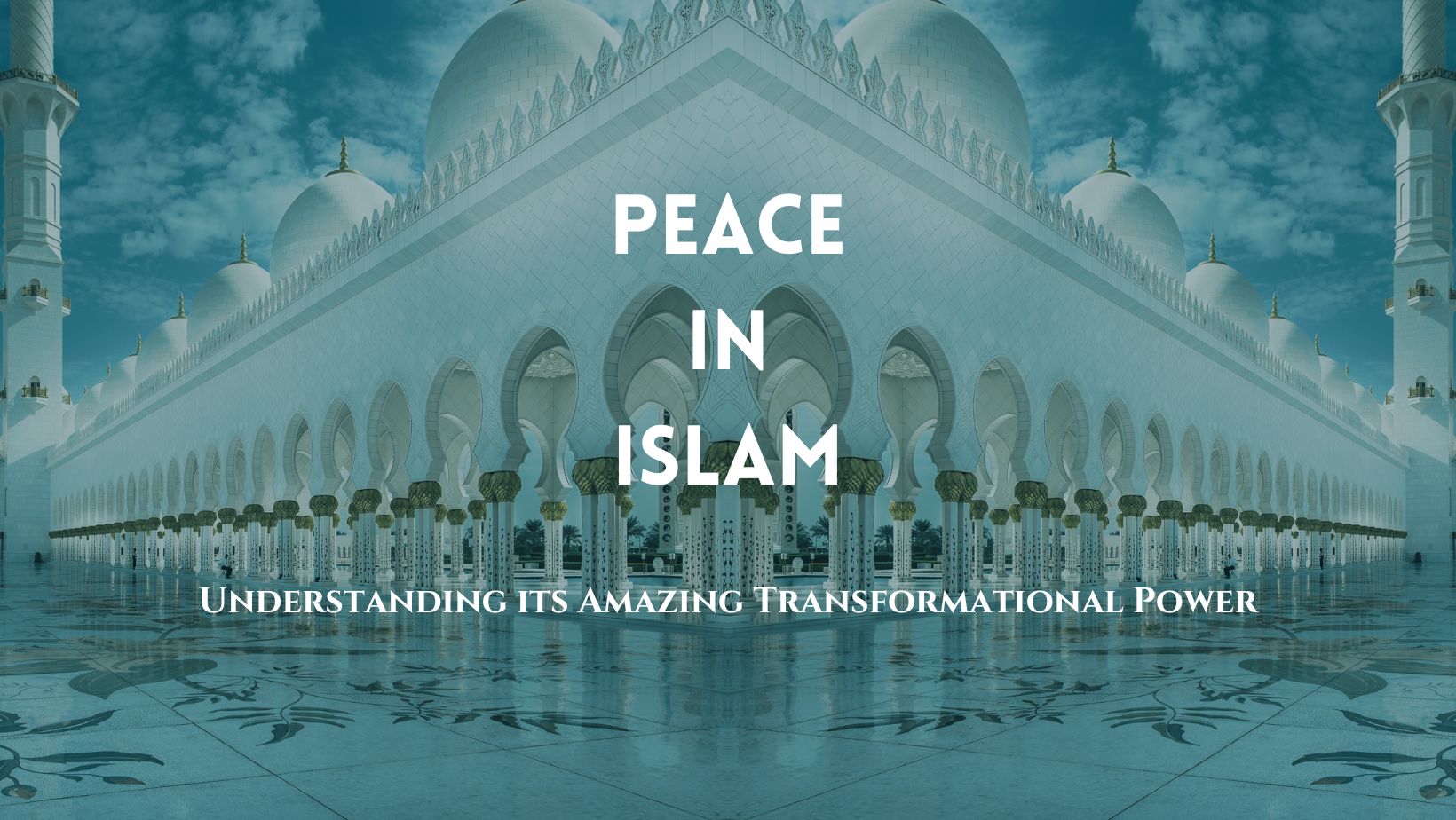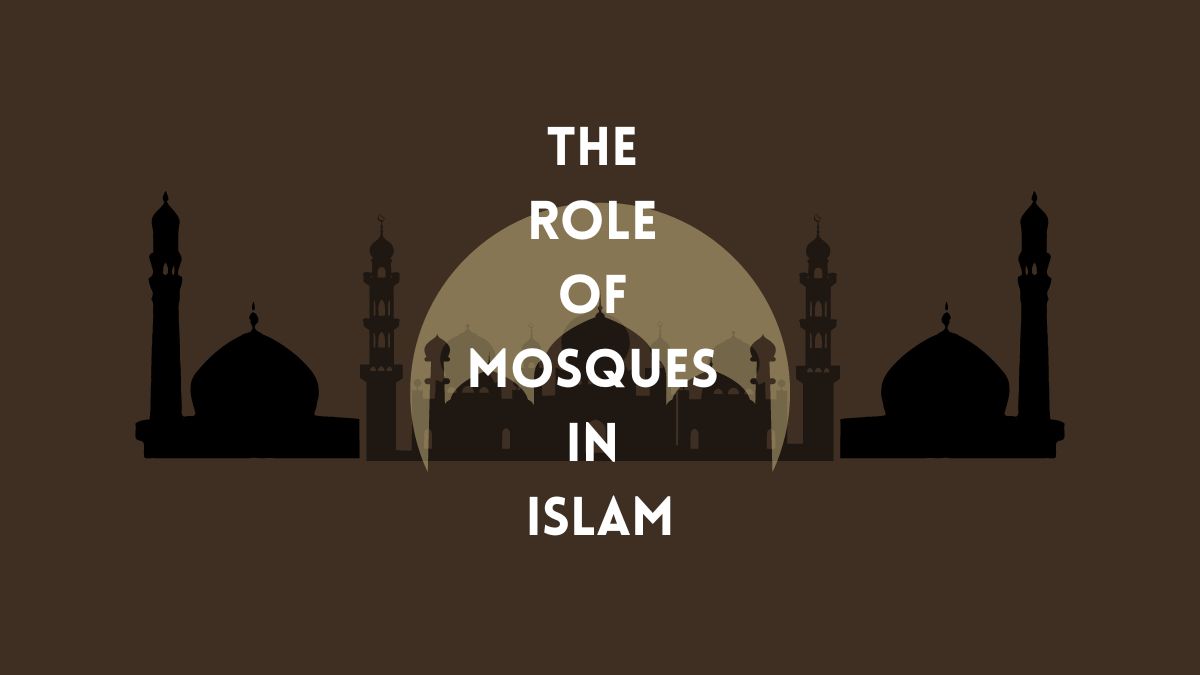Peace in Islam is achieved through submission to Allah’s will and living in harmony with others. Islam promotes peace through tolerance, compassion, and justice.
Islam, a religion of over 1. 8 billion believers, emphasizes the importance of peace both internally and externally. The Quran promotes peace and condemns aggression, teaching followers to strive for peaceful coexistence and resolve conflicts through dialogue. Prophet Muhammad’s teachings and actions advocate for peace, mercy, and kindness, inspiring Muslims to pursue peace in their daily lives.
The concept of “Salam,” meaning peace, forms the basis of Islamic greetings and serves as a reminder of the importance of peace in Islam. Understanding the significance of peace in Islam is essential for fostering mutual respect and understanding among people of different faiths.
Related Article: The Power of Islam: Unleashing its Transformational Potential

Related Article: How Does Islam Affect Daily Life: Unveiling the Impact
You may also read: Unlocking the Power of Ummah Significance
The Concept Of Peace In Islam
Peace is fundamental in Islam, promoting harmony and tranquility among individuals and communities. Central to the faith, Islam teaches compassion, justice, and respect for all, fostering peaceful coexistence globally. Embracing peace as a core principle, Muslims strive to create a world characterized by unity and understanding.
Peace as a fundamental concept, emphasizing harmony, tranquility, and justice.
Related Article: Islamic Spirituality: Unlocking Inner Peace and Enlightenment

Credit: www.amazon.com
Related Article: Tawheed: The Essence of Islamic Monotheism Explained
The Definition Of Peace
Peace is more than just the absence of conflict; it encompasses a state of well-being for individuals and society.
Peace As A Core Value In Islam
Islam places great emphasis on fostering peace within oneself, with others, and with the environment, promoting compassion and understanding. Islam values peace as a cornerstone for social cohesion and stability, encouraging forgiveness and reconciliation. In Islamic teachings, peace is not a passive state but an active pursuit through acts of kindness, charity, and empathy. Islamic principles prioritize peace as a means to resolve disputes peacefully and avoid violence or aggression. Peace serves as a guiding principle in Islamic relationships, emphasizing mutual respect, tolerance, and cooperation. Peace in Islam is a holistic concept that integrates spiritual, social, and ethical dimensions for a harmonious existence. Overall, the concept of peace in Islam fosters a culture of unity, compassion, and well-being for all individuals and communities. Let’s embrace the concept of peace in Islam for a harmonious world.

Credit: www.amazon.com
Related Article: Islam And Modernity: Bridging Tradition and Progress
Islamic Teachings On Peace
Islamic Teachings on Peace: Islam promotes peace as a fundamental concept, emphasizing harmony and tranquility. Let’s delve into the teachings of Islam regarding peace.
The Quran’s Emphasis On Peace
The Quran is the holy book of Islam, and it places a strong emphasis on peace. It advocates for resolving conflicts through dialogue and forgiveness.
The Prophet Muhammad’s Teachings On Peace
Prophet Muhammad, the founder of Islam, taught the importance of peace through his actions and words. He promoted kindness, compassion, and understanding.
Transformative Power Of Peace In Islam
Islam is a religion that places great emphasis on peace. The transformative power of peace in Islam is truly remarkable, as it has the potential to bring about inner peace, and personal transformation, and foster positive relationships and communities. Let’s explore these aspects further:
Inner Peace And Personal Transformation
Inner peace is an essential aspect of Islam, emphasizing the strong connection between peace and personal transformation. When individuals find inner tranquility, it enables them to develop a deep sense of self-awareness and introspection. This self-reflection often inspires personal growth, leading to positive changes in attitude, behavior, and outlook on life.
Islam teaches us that the path to inner peace involves having complete trust in Allah and surrendering oneself to His will. By embracing this concept, Muslims understand that peace can only be attained when they submit to the guidance provided by Allah’s teachings.
The transformative power of inner peace in Islam extends beyond the individual level. When a person experiences inner tranquility, it not only positively impacts their own life but also influences those around them. This contagious positive energy begins to radiate and inspires others to seek peace within themselves as well.
Peace In Relationships And Communities
A peaceful and harmonious society is one of the primary goals of Islam. Islam teaches that relationships should be based on compassion, respect, and kindness. Muslims are encouraged to strive for peaceful interactions in their personal relationships and to foster unity within their communities.
In the Quran, Allah instructs Muslims to reconcile and forgive, promoting forgiveness and reconciliation as a means of resolution in conflicts. This emphasis on forgiveness is a vital aspect of maintaining peace, not only between individuals but also within communities.
Islam promotes the concept of a global community, emphasizing that all human beings are equal in the eyes of Allah. Therefore, Muslims are encouraged to value diversity and promote inclusivity. The transformative power of peace in relationships and communities lies in its ability to break down barriers, foster understanding, and create an environment that is conducive to collaboration and mutual respect.
When individuals and communities embrace the transformative power of peace in Islam, it paves the way for personal growth, positive relationships, and a harmonious society. Through inner peace and personal transformation, each person can contribute to the collective goal of creating a peaceful world.
Are you interested in learning more about the transformative power of peace in Islam? Stay tuned for our upcoming blog posts exploring various aspects of peace in Islam.
Peaceful Coexistence
Peaceful coexistence is a fundamental tenet of Islam, emphasizing the importance of living harmoniously with people of all faiths and cultures. In the context of Islam, peaceful coexistence encompasses the promotion of interfaith dialogue and mutual respect, as well as the fostering of multicultural societies where diversity is celebrated. By upholding these principles, the Islamic perspective on peace encourages unity and understanding among all people, regardless of their backgrounds or beliefs.
Interfaith Dialogue And Mutual Respect
Islam advocates for interfaith dialogue as a means of promoting understanding and cooperation among followers of different religions. This fosters an environment of mutual respect, where individuals from diverse faith traditions can engage in constructive conversations, fostering a sense of unity and shared values. By actively engaging in interfaith dialogue, Muslims uphold the principle of peaceful coexistence as a means of building bridges between communities and fostering a climate of understanding and acceptance.
Promoting Peaceful Coexistence In Multicultural Societies
In multicultural societies, the Islamic principle of peaceful coexistence advocates for promoting the acceptance and celebration of diversity. This involves respecting the customs, traditions, and beliefs of individuals from various cultural backgrounds, and creating an inclusive environment where everyone feels valued and welcomed. Through promoting peaceful coexistence in multicultural societies, Islam highlights the importance of nurturing a climate of respect and understanding, where differences are embraced and contribute to societal enrichment.
Peacebuilding Efforts In Islamic History
In the history of Islam, peacebuilding efforts have played a significant role in shaping societies and fostering harmony. Through the teachings of the Quran and the actions of Muslim scholars and leaders, Islam has been a steadfast advocate for peace.
The Role Of Muslim Scholars And Leaders
- Muslim scholars and leaders have always emphasized the importance of peace and reconciliation within Islamic societies.
- They have provided guidance on resolving conflicts and promoting understanding among people of different faiths.
- Their teachings have served as a foundation for promoting peacebuilding efforts throughout Islamic history.
Historical Examples Of Peacebuilding In Islamic Societies
- The treaty of Hudaybiyyah, signed by Prophet Muhammad, aimed at establishing peace and allowed for the spread of Islam through peaceful means.
- The Andalusian period in Spain was a remarkable example of a peaceful coexistence between Muslims, Christians, and Jews, fostering a flourishing environment for education, culture, and science.
- The Ottoman Empire, known for its pluralistic approach, promoted religious tolerance and protected the rights of non-Muslim communities, contributing to the unity and stability of its diverse territories.
Related Article: What Makes Islam Unique: Insights & Distinctions

Related Article: Ramadan is Coming: The Ultimate Blessings from the Almighty
Challenges To Peace In Islam
Despite being a religion of peace, Islam faces numerous challenges that hinder the attainment of tranquility and harmony among its followers and the wider global community. These challenges emerge from various sources, such as the misinterpretation and misrepresentation of Islamic teachings, as well as the emergence of extremism and radicalization within certain segments of the Muslim population. In order to establish and promote lasting peace in Islam, it is crucial to address these challenges effectively and proactively.
Misinterpretation And Misrepresentation Of Islamic Teachings
One of the major hurdles to peace in Islam is the misinterpretation and misrepresentation of its teachings. Unfortunately, there are individuals and groups who selectively interpret Islamic scriptures out of context, leading to distorted and extremist beliefs. This misinterpretation often results in a distorted understanding of the religion, leading to a negative perception of Islam as a whole.
This misrepresentation not only hampers the peaceful coexistence of Muslims within their communities but also fuels Islamophobia and conflicts between different religious groups. It is important to combat this challenge by promoting knowledge and understanding of the true values and principles of Islam, in order to counter the misinterpretations and misrepresentations.
Extremism And Radicalization
Another significant challenge to peace in Islam is the rise of extremism and radicalization among certain segments of the Muslim population. These extremist elements interpret Islamic teachings in an extreme and often violent manner, distorting the religion’s core principles of peace, compassion, and justice.
The consequences of extremism and radicalization can be devastating, as they breed violence, hatred, and intolerance. They not only endanger the lives of innocent people but also tarnish the image of Islam and its teachings. Combating extremism requires a multifaceted approach, including educating individuals about the true essence of Islam, fostering dialogue and understanding between different religious and cultural groups, and promoting social and economic development in marginalized communities.
The challenges to peace in Islam are complex and require continuous efforts from both Muslims and non-Muslims to overcome. By addressing issues such as misinterpretation, misrepresentation, extremism, and radicalization, we can create an environment that fosters understanding, tolerance, and peace among individuals and communities of all backgrounds.
To know more about Inner Peace In Islam>>
Related Article: How to Be a Better Muslim: 5 Empowering Habits
Conclusion
In Islam, peace serves as a core value, emphasizing harmony, unity, and compassion. With a focus on seeking peace within oneself and extending it to others, Islam promotes understanding, tolerance, and forgiveness to foster a peaceful coexistence among individuals and communities.
By following the teachings of Islam, believers strive to create a world filled with tranquility, where respect and justice prevail. Embracing the principles of peace in Islam enables individuals to lead fulfilling lives and contributes to the betterment of society as a whole.
Related Article: Spiritual Benefits of Ramadan: Enhance Your Inner Peace
You may also read: Free Palestine Movement: Voices for Unyielding Justice





Amazing writing. Carry on.
Thanks for being with us. Stay Connected.